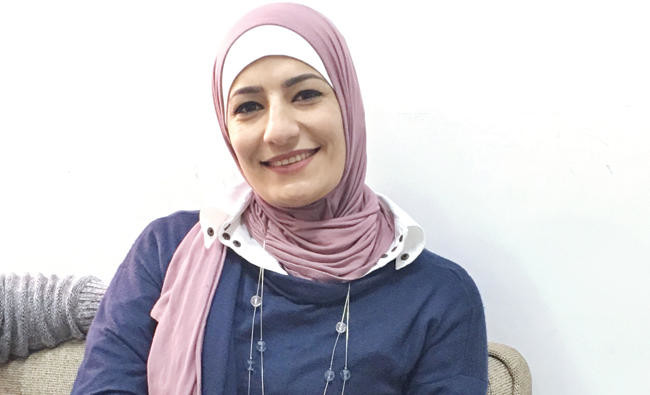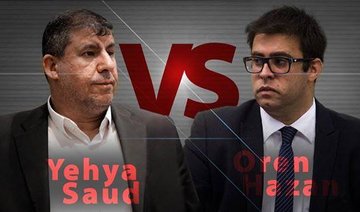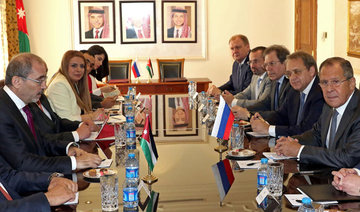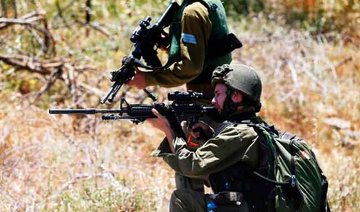LONDON: Israa Ababneh was skeptical when her uncle signed her up for a plumbing course at a vocational center in North Jordan.
“At first I thought what am I doing here? It’s just for men and it’s hard.”
But she stuck it out for three days and mastered the basics before moving onto practical skills.
“That’s when we started to have fun, learning how to cut iron pipes, connect them and fix leakages behind a wall.”
The 27-year-old is one of a growing number of women taking up plumbing in Jordan, raising eyebrows in local communities where social norms prevent many women from working, particularly in roles traditionally occupied by men.
Some 81 percent of women in Jordan are unemployed, according to a report by UNHCR.
The country ranks 134th out of 142 in terms of women’s economic contribution, according to a 2016 study by the Jordan Strategy Forum.
At first, Ababneh and the other female plumbers she works with found these patriarchal attitudes prohibitive — particularly when people refused them work because they were women.
“They used to laugh and say we couldn’t do it. It was like a challenge.”
Now, she said, clients call specifically seeking female plumbers.
“A man just mends the faucet and leaves a mess but when a woman does it she fixes the problem and leaves it clean.”
Women plumbers can also gain access that is off limits to men, carrying out work in households where male family members are not present.
This means leaks can be fixed faster with less water lost – a big benefit for a country where water availability is among the lowest in the world.
Jordan has an annual water supply of just 150 cubic meters per person, well below the official UN threshold for “absolute scarcity” set at 500 cubic meters.
“Water is a highly sensitive issue in Jordan,” said Bjorn Zimprich, project manager at German Development Agency GIZ, which initiated the Water Wise Women’s Initiative to train female plumbers in the country.
“There have been a lot of awareness campaigns and people know that water is scarce but with regards to behavioral impact there is limited impact.”
Most Jordanian households subsist on just one water tank a week so fixing a burst pipe quickly can make all the difference for families dependent on limited supplies.
With between 40 and 50 percent of Jordan’s water lost through its aging distribution network, due in large part to leakages and theft, there is an urgent need for more efficient maintenance.
Conservation is a key concern on the training program, which aims to raise awareness surrounding water scarcity among local and refugee communities across Jordan.
“People from Syria, Iraq and Palestine are all living in this country and sharing the water,” said Ababneh, pointing to the additional pressure on Jordan’s limited resources created by a refugee crisis.
“We go into schools and tell them how to stop leakages and advise households on using water-saving devices,” says Ababneh, who is now part of a professional female plumbing cooperative.
The women work in pairs, with different teams responding to calls around the country.
Plumber Ala Abu Heja, 32, hopes that this could help pave the way for more diversity in Jordan’s labor force.
“Before, a female plumber is not something people here would accept.
Now we’re seeing some females working in electricity, plumbing and mechanics so these initiatives will influence the entrance of women into other occupations traditionally dominated by men.”
More than 160 women have now graduated from the program, which runs separate sessions for male trainees.
Nargis Al-Mahmoud, 23, arrived in Jordan in 2013 after bombs destroyed her home in Dar’aa, Syria. With little means of generating an income in Jordan, her husband signed up for the course.
“He was really struggling to understand the theoretical part but reading his notebook one time I said, are you kidding? This is something I can do.”
The daughter of a handyman, Al-Mahmoud already knew her way around a toolbox and she enrolled in the program, eager to pursue a career in plumbing. “The first time I went to a house they started to make fun of me and I ran out crying. It was really bad. I told my husband and he said just stay at home, we don’t need this.
But Al-Mahmoud was determined to put her new skills to use. “I didn’t do all this training just to sit at home,” she said. After fixing a few things for free to showcase her skills, Al-Mahmoud’s client base began to grow and she is now working alongside her husband to expand their budding family business.
For Abu Heja, the opportunity to earn and contribute to the household budget has had a personal as well as a financial impact. “I now have a source of income and a greater sense of self-respect,” she said, a feeling shared by many graduates of the program. “In the past, we felt shy and restricted, but now we’re working, we feel we can go wherever we like and do what we want. It’s really built our confidence in a way that we never thought it would.”
Jordan’s women plumbers fix pipes as men leave puddles
Jordan’s women plumbers fix pipes as men leave puddles
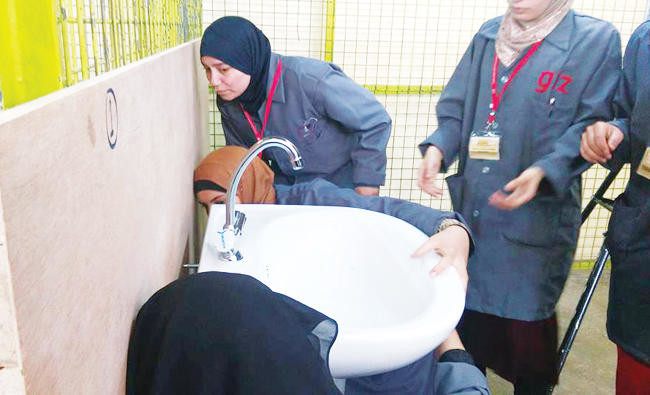
Yemen crisis ‘deeply volatile and unpredictable,’ UN special envoy tells Security Council

- Condemnation of renewed Houthi attacks on Red Sea shipping, the first for 7 months
- Humanitarian chief warns of 17m people going hungry in the country
NEW YORK CITY: The UN Security Council convened on Wednesday for a briefing on the escalating conflict and humanitarian crisis in Yemen, amid growing concerns about regional instability and the resumption of Houthi attacks on commercial shipping in the Red Sea.
The UN’s special envoy for Yemen, Hans Grundberg, described the present period as “deeply volatile and unpredictable,” while noting that there were some fragile hopes for a deescalation following the recent ceasefire agreement between Iran and Israel.
However, he cautioned that the Houthis continue to launch missile attacks against Israel, and recently targeted two commercial vessels in the Red Sea, resulting in civilian casualties and potential environmental damage. They were the first such assaults on international shipping in more than seven months.
“These attacks threaten freedom of navigation and risk dragging Yemen further into regional crises,” Grundberg warned, as he underscored the imperative need to safeguard civilian infrastructure and maintain stability in the country.
He emphasized that while the front lines in the Yemen conflict have largely held, military activity persists across several governorates, with troop movements suggesting an appetite for escalation among some factions.
Grundberg urged all parties involved in the conflict to demonstrate a genuine commitment to peace, including the release of all conflict-related detainees, a process that has been stalled for more than a year.
He also highlighted the dire economic situation in the country, describing it as the “most active front line” of the conflict, with currency devaluation and worsening food insecurity pushing millions toward famine.
In a call for practical cooperation, Grundberg praised recent developments such as the reopening of Al-Dhalea Road, which he said has eased movement and improved economic activity. He urged both sides to build on such progress to restore salaries, services and oil production.
The UN’s under-secretary-general for humanitarian affairs, Tom Fletcher, briefed council members on the accelerating food-security crisis in the country.
“More than 17 million people are going hungry in Yemen, with numbers expected to rise to over 18 million by September,” he said, highlighting the threat to more than a million malnourished children under the age of 5.
Despite funding shortfalls, Fletcher said progress had been made in controlling cholera outbreaks and scaling up nutritional treatments, with more than 650,000 children receiving life-saving aid.
He also cited local-level agreements in Taiz governorate for the joint management of water supplies, and the reopening of a key road between Aden and Sanaa that is facilitating civilian and commercial transport for the first time in seven years.
However, he stressed the urgent need for increased funding of relief efforts, and called for the immediate release of detained UN workers and employees of nongovernmental organizations, echoing Grundberg’s demands.
The US Ambassador to the UN, Dorothy Shea, condemned the recent Houthi attacks on shipping in the Red Sea, including the sinking of the cargo vessel Magic Seas, describing them as “destabilizing” and a violation of freedom of navigation.
She urged the Security Council to renew calls for transparency regarding Houthi attacks on commercial vessels, and reaffirmed the US position in support of Israel’s right to self-defense against Houthi missile and drone attacks. She also condemned the continuing detention by the Houthis of UN and NGO workers and called for their immediate, unconditional release.
“The United States remains committed to depriving the Houthis of resources that sustain their terrorist actions,” she said, stressing that any assistance provided to the Houthis constituted a violation of US law as a result of the group’s designation by Washington as a Foreign Terrorist Organization.
In addition, Shea called for the termination of the UN Mission to Support the Hudaydah Agreement, which she described as outdated and ineffective. Established following the 2018 Stockholm Agreement between the Yemeni government and the Houthis, the role of the mission has been to monitor the ceasefire agreement in the port city of Hodeidah (the UN uses an alternative spelling of the city’s name), oversee the redeployment of forces, monitor ports to ensure they are used for civilian purposes, and facilitate coordination between stakeholders in Yemen, including UN agencies.
US sanctions UN rights expert for Palestinian territories Francesca Albanese

- US Secretary of State Marco Rubio attacked Albanese for her criticism of Washington policy on Gaza and for ‘biased and malicious activities’
WASHINGTON: US Secretary of State Marco Rubio on Wednesday announced Washington was sanctioning the United Nations special expert on the Palestinian territories, following her criticism of Washington policy on Gaza.
“Today I am imposing sanctions on UN Human Rights Council Special Rapporteur Francesca Albanese for her illegitimate and shameful efforts to prompt (International Criminal Court) action against US and Israeli officials, companies, and executives,” Rubio said on social media.
In a subsequent statement, he slammed the UN expert’s strident criticism of the United States and said she recommended to the ICC that arrest warrants be issued targeting Israel’s Prime Minister Benjamin Netanyahu.
Rubio also attacked her for “biased and malicious activities,” and accused her of having “spewed unabashed antisemitism (and) support for terrorism.”
He said she escalated her contempt for the United States by writing “threatening letters” to several US companies, making what Rubio called unfounded accusations and recommending the ICC pursue prosecutions of the companies and their executives.
“We will not tolerate these campaigns of political and economic warfare, which threaten our national interests and sovereignty,” Rubio said.
Albanese has leveled broadsides against the policies of US President Donald Trump, particularly the plan he announced in early February to take over the Gaza Strip and resettle its residents elsewhere.
That proposal, short on details, faced a resounding rejection from Palestinians, Middle East leaders and the United Nations.
Albanese dismissed the Trump proposal as “utter nonsense” and an “international crime” that will sow panic around the world.
“It’s unlawful, immoral and... completely irresponsible because it will make the regional crisis even worse,” she said on February 5 during a visit to Copenhagen.
US envoy calls for change in Lebanese political culture in interview with LBCI Lebanon

- Thomas Barrack says Hezbollah is a Lebanese problem, up to Lebanese people to solve it
BEIRUT: Lebanon’s politicians have spent 60 years “denying, detouring and deflecting,” the US special envoy Tom Barrack said in an interview broadcast on Tuesday.
Barrack has been in Lebanon to talk with political leaders over Washington’s proposals to disarm the powerful militant group Hezbollah.
Asked whether the Lebanese politicians he has been dealing with were actually engaging with him or just buying time, the diplomat responded “both.”
“The Lebanese political culture is deny, detour and deflect,” Barrack said. “This is the way that it's been for 60 years, and this is the task we have in front of us. It has to change.”
After meeting President Joseph Aoun on Monday, he reacted positively to the Lebanese government’s response to a US plan to remove Hezbollah’s weapons.
In an interview with Lebanese broadcaster LBCI, Barrack said he believed the president, prime minister and the speaker of the house were being “candid, honest, and forthright” with him.
But he warned Lebanon’s politicians that the region is changing and if the politicians didn’t want to change as well “just tell us, and we'll not interfere.”
While he did not disclose the details of the US proposals, or the Lebanese response, Barrack said Lebanon’s leadership had to be willing to take a risk.
“We need results from these leaders,” he said.
Lebanon’s politicians have long been accused of corruption and putting self-interest first ahead of the good of the nation and the Lebanese people.
Public anger came to a head in 2019 with mass public protests against corruption and financial hardship.
The Lebanese economy spiraled into a financial crisis with the country defaulting on its debt and the currency collapsing.
Barrack, who is also Washington’s ambassador to Turkiye and special envoy for Syria, said the US was offering Lebanon a helping hand rather than trying to interfere in its politics.
“We’ve only said one thing, if you want us to help you, we're here to usher, we’re here to help. We’re here to protect to the extent that we can,” he said.
“But we’re not going to intervene in regime change. We’re not going to intervene in politics. And if you don’t want us, no problem, we’ll go home. That’s it.”
Barrack said Hezbollah, which is viewed as a terrorist organization by the US and is also a political party with 13 MPs in Lebanon “is a Lebanese problem, not a world problem.”
“We’ve already, from a political point of view, said it’s a terrorist organization. They mess with us anywhere, just as the president (Trump) has established on a military basis, they’re going to have a problem with us. How that gets solved within Lebanon is another issue … It’s up to the Lebanese people.”
Barrack said the disarmament of Hezbollah had always been based on a simple fact for President Donald Trump: “One nation, one people, one army.”
“If that's the case, if that’s what this political body chooses, then we will usher, will help, will influence, and will be that intermediary with all of the potential combatants or adversaries who are on your borders,” Barrack said.
The diplomat dismissed media speculation that the US had set timelines for its proposals, but said while Trump had been extremely proactive on Lebanon, he would not wait long for progress.
“Nobody is going to stick around doing this until next May,” he said. “I don’t think there’s ever been a president since Dwight Eisenhower who came out with such ferocity for Lebanon. On his own, he (Trump) has the courage, he has the dedication, he has the ability. What he doesn’t have is patience.
“If Lebanon wants to just keep kicking this can down the road, they can keep kicking the can down the road, but we’re not going to be here in May having this discussion.”
During the near hour-long, wide-ranging interview, Barrack, whose grandparents emigrated from Lebanon to the US, everybody across Lebanon’s many religions and sects was tired of war and discontent.
“If we have 19 different religions and 19 different communities and 19 different confessionals, there's one thing that’s above that, and that’s being Lebanese,” he said.
The Trump administration is keen to support Lebanon and Aoun, who became president in January, as the country struggles to emerge from years of economic hardship, political turmoil and regional unrest.
Hezbollah, which is backed by Iran, had become the most powerful military force in the country and a major political power, but was significantly weakened by an Israeli campaign against the group last year.
Its weapons arsenal has remained an ongoing thorn in the side of US-Lebanon relations.
Along with disarming Hezbollah, the US proposals presented to Lebanese officials by Barrack last month are thought to include economic reforms to help the country move forward.
UN chief outlines four options for embattled Palestinian relief agency UNRWA

- UNRWA is also dealing with a dire financial crisis, facing a $200-million deficit
- US was UNRWA’s biggest donor, but former President Joe Biden paused funding in January 2024
UNITED NATIONS: A review of the embattled United Nations Palestinian relief agency UNRWA, ordered by Secretary-General Antonio Guterres, has identified four possible ways forward for the organization that has lost US funding and been banned by Israel.
The proposals, seen by Reuters, are: inaction that could see the potential collapse of UNRWA; a reduction of services; the creation of an executive board to advise UNRWA; or maintaining UNRWA’s rights-based core while transferring services to host governments and the Palestinian Authority. While Guterres ordered the strategic assessment of UNRWA in April as part of his wider UN reform efforts, only the 193-member UN General Assembly can change UNRWA’s mandate.
UNRWA was established by the General Assembly in 1949 following the war surrounding the founding of Israel. It provides aid, health and education to millions of Palestinians in Gaza, the West Bank, Syria, Lebanon and Jordan.
“I believe it is imperative that Member States take action to protect the rights of Palestine refugees, the mandate of UNRWA and regional peace and security,” Guterres wrote in a letter dated on Monday and seen by Reuters submitting the UNRWA assessment to the General Assembly. The review comes after Israel adopted a law in October, which was enacted on January 30, that bans UNRWA’s operation on Israeli land — including East Jerusalem, which Israel annexed in a move not recognized internationally — and contact with Israeli authorities.
UNRWA is also dealing with a dire financial crisis, facing a $200-million deficit. The US was UNRWA’s biggest donor, but former President Joe Biden paused funding in January 2024 after Israel accused about a dozen UNRWA staff of taking part in the deadly October 7, 2023, attack by Palestinian militants Hamas that triggered the war in Gaza. The funding halt was then extended by the US Congress and President Donald Trump.
Four options
The UN has said nine UNRWA staff may have been involved in the Hamas attack and were fired. A Hamas commander in Lebanon — killed in September by Israel — was also found to have had an UNRWA job. The UN has vowed to investigate all accusations and repeatedly asked Israel for evidence, which it says has not been provided. Israel has long been critical of UNRWA, while UNRWA has said it has been the target of a “fierce disinformation campaign” to “portray the agency as a terrorist organization.” Guterres and the UN Security Council have described UNRWA as the backbone of the aid response in Gaza.
The first possible option outlined by the UNRWA strategic assessment was inaction and the potential collapse of the agency, noting that “this scenario would exacerbate humanitarian need, heighten social unrest, and deepen regional fragility” and “represent a significant abandonment of Palestine refugees by the international community.”
The second option was to reduce services by “aligning UNRWA’s operations with a reduced and more predictable level of funding through service cuts and transfer of some functions to other actors.”
The third option was to create an executive board to advise and support UNRWA’s commissioner-general, enhance accountability and take responsibility for securing multi-year funding and aligning UNRWA’s funding and services. The final potential option would see UNRWA maintain its functions as custodian of Palestine refugee rights, registration, and advocacy for refugee access to services, “while progressively shifting service provision to host governments and the Palestinian Authority, with strong international commitment to funding.”
Jordan resumes aid convoys to Palestinians in Gaza as conditions deteriorate

- Aid and food will be distributed in northern Gaza to ensure it reaches the most affected families
- Initiative involved the World Food Programme and the Jordanian armed forces
LONDON: Jordan on Wednesday resumed the dispatch of relief convoys to the besieged and war-torn Gaza Strip after months of an Israeli blockade that hindered humanitarian aid from reaching the Palestinian coastal enclave.
The Jordan Hashemite Charity Organization sent 40 trucks loaded with basic food supplies into Gaza as part of Amman’s humanitarian efforts to support Palestinians. The initiative was in collaboration with the World Food Programme and the Jordanian armed forces.
The aid and food will be distributed in northern Gaza to ensure it reaches the most affected families and supports Palestinians as humanitarian and living conditions continue to deteriorate due to Israeli attacks since late 2023.
Hussein Shibli, the secretary-general of JHCO, said the resumption of convoys highlights Jordan’s commitment under King Abdullah II to support Palestinians.
Jordan collaborated with the WFP to deliver a mobile bakery that supplied thousands of loaves of bread daily to residents in northern Gaza. Shibli said that cooperation with the WFP included projects for distributing meals and clean water, because infrastructure was severely damaged during Israeli bombings.
Jordan was among the first countries to conduct airlift missions in the early days of the war, delivering relief to Gaza. More than 56,000 Palestinians have reportedly been killed in Israeli strikes on Gaza, which have been described as genocide by human rights groups and several heads of state.


